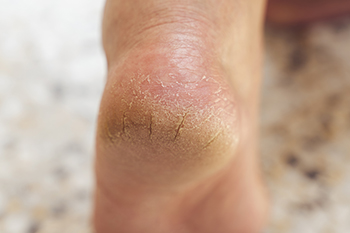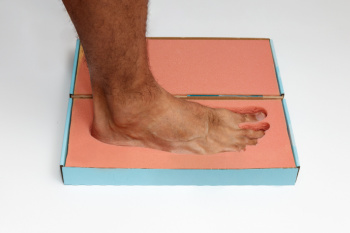Connect With Us
Items filtered by date: August 2024
Complications From Diabetic Neuropathy

Diabetic neuropathy, particularly affecting the feet, is a serious concern for those with diabetes. Over time, high blood sugar can cause nerve damage, leading to sensations such as burning, tingling, or even stabbing pain in the feet. However, as the disease progresses, it often results in numbness, making it difficult for diabetic patients to notice injuries like cuts, blisters, or sores. Without the ability to feel pain, their injuries can go unnoticed and untreated, potentially leading to severe complications like infections, ulcers, or even gangrene. In extreme cases, tissue removal or amputation may be necessary. Regular inspections and early detection of cuts, blisters, or open sores on your foot are vital to prevent these outcomes. A podiatrist plays a key role in managing diabetic neuropathy by identifying such issues early, providing treatment, and advising on proper foot care. If you have foot pain that may be linked to neuropathy, it is suggested that you schedule an appointment with a podiatrist for an exam and treatment.
Neuropathy
Neuropathy can be a potentially serious condition, especially if it is left undiagnosed. If you have any concerns that you may be experiencing nerve loss in your feet, consult with Ali Davis, DPM from The Foot Clinic. Our doctor will assess your condition and provide you with quality foot and ankle treatment for neuropathy.
What Is Neuropathy?
Neuropathy is a condition that leads to damage to the nerves in the body. Peripheral neuropathy, or neuropathy that affects your peripheral nervous system, usually occurs in the feet. Neuropathy can be triggered by a number of different causes. Such causes include diabetes, infections, cancers, disorders, and toxic substances.
Symptoms of Neuropathy Include:
- Numbness
- Sensation loss
- Prickling and tingling sensations
- Throbbing, freezing, burning pains
- Muscle weakness
Those with diabetes are at serious risk due to being unable to feel an ulcer on their feet. Diabetics usually also suffer from poor blood circulation. This can lead to the wound not healing, infections occurring, and the limb may have to be amputated.
Treatment
To treat neuropathy in the foot, podiatrists will first diagnose the cause of the neuropathy. Figuring out the underlying cause of the neuropathy will allow the podiatrist to prescribe the best treatment, whether it be caused by diabetes, toxic substance exposure, infection, etc. If the nerve has not died, then it’s possible that sensation may be able to return to the foot.
Pain medication may be issued for pain. Electrical nerve stimulation can be used to stimulate nerves. If the neuropathy is caused from pressure on the nerves, then surgery may be necessary.
If you have any questions, please feel free to contact our office located in Overland Park, KS . We offer the newest diagnostic and treatment technologies for all your foot care needs.
Causes and Symptoms of Cracked Heels

Cracked heels, also known as heel fissures, occur when the skin on the heels becomes dry and thickened, leading to painful cracks, termed fissures. This condition often results from excessive pressure, poor foot hygiene, or prolonged exposure to dry environments. Common causes include wearing open-backed shoes, standing for long periods of time, and having underlying conditions like diabetes or eczema. Risk factors include obesity, lack of moisture, and certain medical conditions that affect skin health. Symptoms of cracked heels often include rough, thickened skin on the heels, visible cracks, and discomfort or pain, particularly while walking. Painful cracked heels can interfere with completing daily activities. If you have developed this condition, it is strongly suggested that you visit a podiatrist who can offer treatment, which may include prescribed medication.
If the skin on your feet starts to crack, you may want to see a podiatrist to find treatment. If you have any concerns, contact Ali Davis, DPM from The Foot Clinic. Our doctor can provide the care you need to keep you pain-free and on your feet.
Cracked Heels
It is important to moisturize your cracked heels in order to prevent pain, bleeding, and infection. The reason cracked heels form is because the skin on the foot is too dry to support the immense pressure placed on them. When the foot expands, the dry skin on the foot begins to split.
Ways to Help Heal Them
- Invest in a good foot cream
- Try Using Petroleum Jelly
- Ease up on Soaps
- Drink Plenty of Water
Ways to Prevent Cracked Heels
- Moisturize After Showering
- Skip a Shower
- Keep Shower Water Lukewarm
- Don’t Scrub Your Feet
If you are unsure how to proceed in treating cracked heels, seek guidance from a podiatrist. Your doctor will help you with any questions or information you may need.
If you have any questions, please feel free to contact our office located in Overland Park, KS . We offer the newest diagnostic and treatment technologies for all your foot care needs.
Assessing Muscle Ankle Strength
 Ankle muscle strength is important for maintaining stability, balance, and overall mobility. Strong ankle muscles support daily activities such as walking, running, and jumping, and help prevent injuries by providing support and absorbing shock. Ankle muscle testing evaluates the strength and functionality of the muscles surrounding the ankle joint. This assessment helps to identify weaknesses or imbalances that may contribute to instability or increased injury risk. Testing typically involves exercises and movements that challenge the ankle's range of motion and strength, such as resistance tests and functional tasks. Poor ankle strength can result from injury, inactivity, or medical conditions like arthritis. If ankle strength is found to be poor, targeted exercises, and strength training can help improve muscle function. Addressing underlying causes, such as correcting biomechanical issues or treating injuries, is also essential to restoring optimal ankle strength and function. If you have ankle pain and feel weakness in your ankles, it is suggested that you schedule an appointment with a podiatrist for an evaluation and treatment options.
Ankle muscle strength is important for maintaining stability, balance, and overall mobility. Strong ankle muscles support daily activities such as walking, running, and jumping, and help prevent injuries by providing support and absorbing shock. Ankle muscle testing evaluates the strength and functionality of the muscles surrounding the ankle joint. This assessment helps to identify weaknesses or imbalances that may contribute to instability or increased injury risk. Testing typically involves exercises and movements that challenge the ankle's range of motion and strength, such as resistance tests and functional tasks. Poor ankle strength can result from injury, inactivity, or medical conditions like arthritis. If ankle strength is found to be poor, targeted exercises, and strength training can help improve muscle function. Addressing underlying causes, such as correcting biomechanical issues or treating injuries, is also essential to restoring optimal ankle strength and function. If you have ankle pain and feel weakness in your ankles, it is suggested that you schedule an appointment with a podiatrist for an evaluation and treatment options.
Ankle pain can have many different causes and the pain may potentially be serious. If you have ankle pain, consult with Ali Davis, DPM from The Foot Clinic. Our doctor will assess your condition and provide you with quality foot and ankle treatment.
Ankle pain is any condition that causes pain in the ankle. Due to the fact that the ankle consists of tendons, muscles, bones, and ligaments, ankle pain can come from a number of different conditions.
Causes
The most common causes of ankle pain include:
- Types of arthritis (rheumatoid, osteoarthritis, and gout)
- Ankle sprains
- Broken ankles
- Achilles tendinitis
- Achilles tendon rupture
- Stress fractures
- Tarsal tunnel syndrome
- Plantar fasciitis
Symptoms
Symptoms of ankle injury vary based upon the condition. Pain may include general pain and discomfort, swelling, aching, redness, bruising, burning or stabbing sensations, and/or loss of sensation.
Diagnosis
Due to the wide variety of potential causes of ankle pain, podiatrists will utilize a number of different methods to properly diagnose ankle pain. This can include asking for personal and family medical histories and of any recent injuries. Further diagnosis may include sensation tests, a physical examination, and potentially x-rays or other imaging tests.
Treatment
Just as the range of causes varies widely, so do treatments. Some more common treatments are rest, ice packs, keeping pressure off the foot, orthotics and braces, medication for inflammation and pain, and surgery.
If you have any questions, please feel free to contact our office located in Overland Park, KS . We offer the newest diagnostic and treatment technologies for all your foot care needs.
An Assessment for Custom-Made Orthotics
 A foot orthotics assessment is an essential process for individuals experiencing foot, leg, or back pain. Orthotics are custom-made shoe inserts designed to support, align, and improve the function of the feet. They can alleviate discomfort caused by conditions such as plantar fasciitis, flat feet, or arthritis, enhancing overall mobility and quality of life. During an orthotics assessment, a podiatrist evaluates your feet, gait, and posture. The process typically begins with a thorough medical history review and a physical examination. The podiatrist may use advanced techniques like gait analysis, where your walking pattern is observed and recorded. They may also take molds or digital scans of your feet to create a precise model. Based on the assessment, custom orthotics are crafted to address your specific needs, providing targeted support and correction. Properly fitted orthotics can significantly reduce pain and prevent further injury. If you are interested in getting custom-made orthotics, it is suggested that you schedule an appointment with a podiatrist for an accurate assessment and fitting.
A foot orthotics assessment is an essential process for individuals experiencing foot, leg, or back pain. Orthotics are custom-made shoe inserts designed to support, align, and improve the function of the feet. They can alleviate discomfort caused by conditions such as plantar fasciitis, flat feet, or arthritis, enhancing overall mobility and quality of life. During an orthotics assessment, a podiatrist evaluates your feet, gait, and posture. The process typically begins with a thorough medical history review and a physical examination. The podiatrist may use advanced techniques like gait analysis, where your walking pattern is observed and recorded. They may also take molds or digital scans of your feet to create a precise model. Based on the assessment, custom orthotics are crafted to address your specific needs, providing targeted support and correction. Properly fitted orthotics can significantly reduce pain and prevent further injury. If you are interested in getting custom-made orthotics, it is suggested that you schedule an appointment with a podiatrist for an accurate assessment and fitting.
If you are having discomfort in your feet and would like to try orthotics, contact Ali Davis, DPM from The Foot Clinic. Our doctor can provide the care you need to keep you pain-free and on your feet.
What Are Orthotics?
Orthotics are inserts you can place into your shoes to help with a variety of foot problems such as flat feet or foot pain. Orthotics provide relief and comfort for minor foot and heel pain but can’t correct serious biomechanical problems in your feet.
Over-the-Counter Inserts
Orthotics come in a wide variety of over-the-counter inserts that are used to treat foot pain, heel pain, and minor problems. For example, arch supports can be inserted into your shoes to help correct overarched or flat feet, while gel insoles are often used because they provide comfort and relief from foot and heel pain by alleviating pressure.
Prescription Orthotics
If over-the-counter inserts don’t work for you or if you have a more severe foot concern, it is possible to have your podiatrist prescribe custom orthotics. These high-quality inserts are designed to treat problems such as abnormal motion, plantar fasciitis, and severe forms of heel pain. They can even be used to help patients suffering from diabetes by treating foot ulcers and painful calluses and are usually molded to your feet individually, which allows them to provide full support and comfort.
If you are experiencing minor to severe foot or heel pain, it’s recommended to speak with your podiatrist about the possibilities of using orthotics. A podiatrist can determine which type of orthotic is right for you and allow you to take the first steps towards being pain-free.
If you have any questions please contact our office located in Overland Park, KS . We offer the newest diagnostic and treatment technologies for all your foot and ankle needs.
Why Live with Pain and Numbness in Your Feet?
Blog Archives
- March 2025
- February 2025
- January 2025
- December 2024
- November 2024
- October 2024
- September 2024
- August 2024
- July 2024
- June 2024
- May 2024
- April 2024
- March 2024
- February 2024
- January 2024
- December 2023
- November 2023
- October 2023
- September 2023
- August 2023
- July 2023
- June 2023
- May 2023
- April 2023
- March 2023
- February 2023
- January 2023
- December 2022
- November 2022
- October 2022
- September 2022
- August 2022
- July 2022
- June 2022
- May 2022
- April 2022
- March 2022
- February 2022
- January 2022
- December 2021
- November 2021
- October 2021
- September 2021
- August 2021
- July 2021
- June 2021
- May 2021
- April 2021
- March 2021
- February 2021
- January 2021
- December 2020
- November 2020
- October 2020
- September 2020
- August 2020
- July 2020
- June 2020
- May 2020
- April 2020
- March 2020
- February 2020
- January 2020
- December 2019
- November 2019
- October 2019
- September 2019

